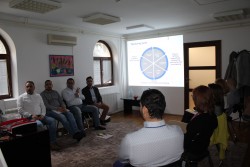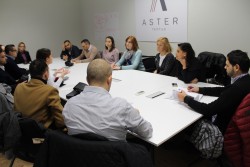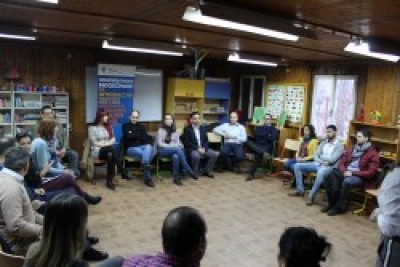During the second week of December, REF staff from the REF offices of Hungary, Slovakia, and Romania who are implementing the “Shaping Academic and Employment Skills for Young Roma” (SHAPYR) project funded by Velux Foundations participated in a study visit to Serbia. The study visit was comprised of a two- day workshop, “Training for Trainers” and a two- day site visit to Southern Serbia, where staff of the Serbian and Hungarian REF offices have been implementing a KfW- supported project, “Employment Empowerment of Young Roma”, since 2016.
The main aim of the “Training of Trainers” workshop for mentors, December 10-11, 2018 was to build the capacity of REF staff from Hungary, Romania and Slovakia to act as trainers to mentors, and to design and deliver a support training program to teachers and/or other adults within the mentoring program. The training encompassed three modules that were designed, accredited, and utilized by REF
Serbia in their activities focused on the mentorship of Roma secondary school students. The mentoring of Roma secondary students is an important component of REF’s approach to secondary school education, therefore, preparing the group of selected teachers as mentors is crucial to ensure that the proper guidance and support gets passed on to Roma students.
The second part of the study visit, saw the staff participate in site visits to three work sites in Southern Serbia where REF beneficiaries currently have mentorship or internship opportunities. By presenting a successful model of cooperation between REF and private sector employers within the KfW -supported project, the visits give an opportunity to the staff from the Hungary, Slovakia, and Romania offices to gain a better insight into REF Serbia’s achievements in facilitating young Roma access to employment. It is our aim that these successful practices can then be applied to the employment component of the SHAPYR project in their home context.
REF staff visited employers including, the Turkish company, Aster Tekstil in Nis, which has trained 23 young Roma and subsequently employed 18 of them as textile workers. Other employers included, small-scale Roma entrepreneurs such as the family business Romano Café, and two plastic and aluminum joinery manufacturers in Bujanovac and Presevo. The small entrepreneurs cooperate with REF Serbia by accepting their young Roma beneficiaries as interns, and in return the young Roma interns gain the necessary knowledge and skills required to increase their competitiveness in the labor market.
In addition to meeting with entrepreneurs and companies, the study visit group had an opportunity to meet with Roma non-governmental organizations at the community center, Indigo in Nis. The meeting was attended by all organizations participating in the process of selecting young Roma for vocational trainings and internships. The aim of this meeting was to present a model of cooperation with Roma civil society organizations, as well as to present the activities of each organization. During the meeting, the study visit group received information on how NGOs operate at the local level, challenges they face, and the importance of mobilizing and motivating the Roma community. They were acquainted with all relevant mechanisms that REF Serbia uses for the establishment of cooperation, and in particular, the significance of the role of Roma mediators, pedagogical assistants, and the Coordinator for Roma Affairs in specific municipalities.
This study visit is the beginning of exchange of experience and lessons learned between the projects implemented by Roma Education Fund in different countries of its operation. The project teams of REF Hungary, Romania, Slovakia, and Serbia are planning to continue with the exchange and to maintain this practice during the course of the two projects.




















